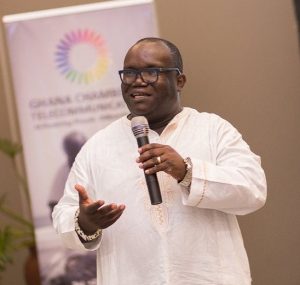 The Chief Executive Officer of the Ghana Chamber of Telecommunications (GCT), Mr. Kenneth Ashigbey has called on the government to include coding as a subject in the school curricula.
The Chief Executive Officer of the Ghana Chamber of Telecommunications (GCT), Mr. Kenneth Ashigbey has called on the government to include coding as a subject in the school curricula.
According to him, coding, which is the language of technology has become the order of the new digital age; hence the need for the people to know about it at an early stage in life.
Mr. Ashigbey made the call in an interview after the launch of the Vodafone National Coding Programme in Accra last Friday.
The programme is to provide hands-on training for 10,000 young people in coding across the country.
Mr. Ashigbey said companies and individuals who did not have the basic understanding of the language for the future-coding—risked losing their jobs to artificial intelligence (AI), Internet of things (IoT) and robotics.
He added that it was not enough to be able to read and write, just as the various curricula in the primary schools have been providing. Instead, there was the need to equip young people with the basic knowledge in coding which would enable the country to have young brains that would be able to build and develop applications that were relevant in solving social problems.
“Being able to read and write is no more enough. You need to be able to code; no matter the roles you play, you would need the ability to know some level of coding to be able to say viable,” he said.
He therefore called the young people to register with the Vodafone coding programme and equip themselves to be able to stay relevant in what he described as “a very complex yet transformative digital world”.
Transformational Agenda
Earlier during the launch, a Deputy Minister of Communications, Mr. Vincent Sowah Odotei, said in a bid to place the country on a digital roadmap, the government, through the ministry, had partnered the World Bank Group to build an impact hub at the Accra Digital Centre (ADC).
He added that the ministry had also built other Enhanced Community Information Centres (ECICs) in deprived communities across the country. The centres, he said, were aimed at sending technology closer to the people, especially those who had been left out in digital experiences.
Mr. Odotei indicated that aside from equipping young people with skills in technology, the centres also provided capacity building for people with practical training on how to use the new technologies that were coming up.
“The ECICs are also aimed at creating a converging point for those in the community to go there and try their hands on electronic gadgets to feel the exciting digital experience, in addition to the children being taught how to code,” he said.
He stated that the ministry was building ICT centres in the various second cycle institutions in a bid to promote the digital transformation programme.
The programme
The Vodafone National Coding Programme is a nationwide digital programme which seeks to train young people in coding languages to prepare them for the future. The programme is also aimed at preparing people to be able to participate in building applications, websites and other social enhanced technological devices and add on to the growth of the economy.
The Chief Executive Officer (CEO) of Vodafone Ghana, Ms Yolanda Cuba, said: “if we have young people who do not have interest in coding, which is a basic language in order to partake in the new technology world, we will fall short in igniting Ghana’s digital revolution.”
She therefore called for dialogue to discuss the pragmatic ways to ensure that the country had an efficient narrative of being the digital hub of West Africa.
Source: graphic.com.gh




